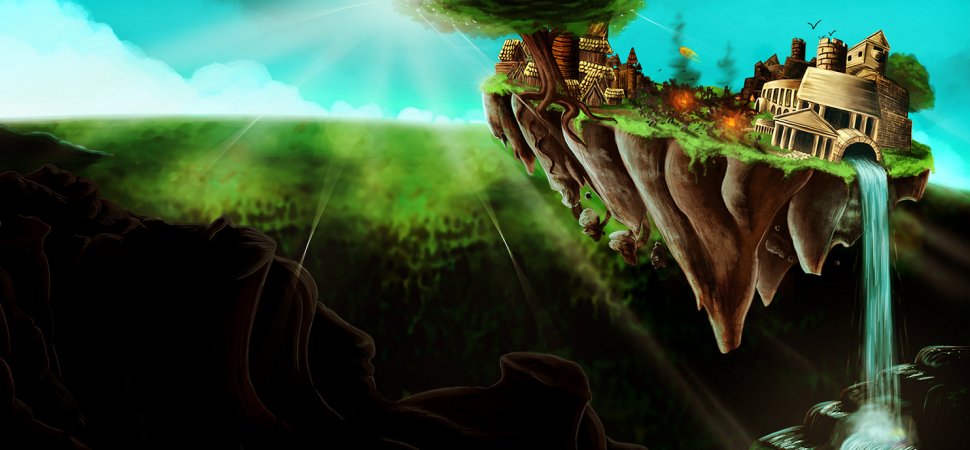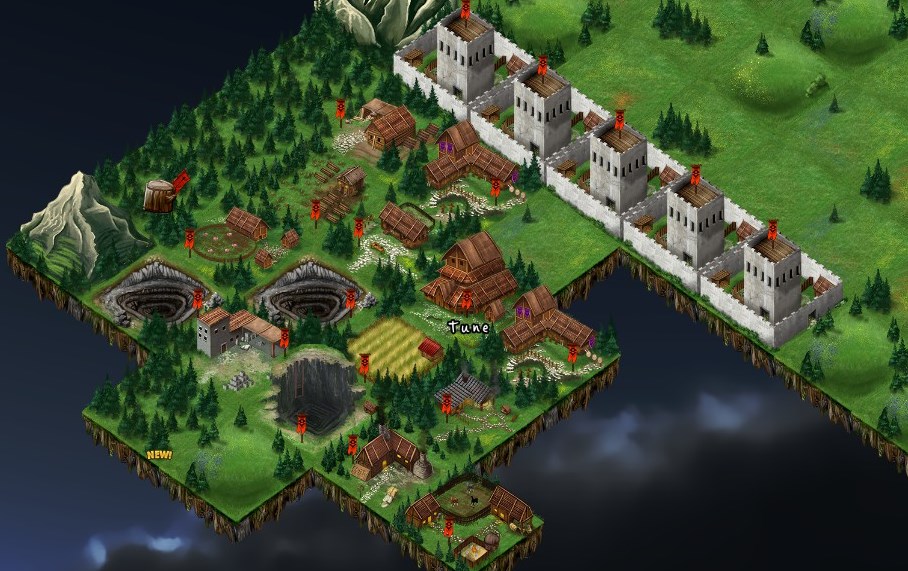

As with so many of Arcen Games’ titles, Skyward Collapse is a game that is both intriguing and genre-bending. It blends the turn-based strategy and, to a degree, 4x gameplay that’s found in the Civilization games with the “god” mechanics of the world-building aspects of Actraiser and Populous. It’s a game of unique subtlety and skill, particularly on the harder difficulties, and it is one that is constantly improving as Arcen listens to feedback from fans. Additionally, like the rest of Arcen’s titles, Skyward Collapse supports cooperative play. Unlike those titles, however, the contribution of those players to the overall goal – and in turn, the overall co-op experience – is arguable.
Before any in-depth discussion of Skyward Collapse and what’s good/bad about it can begin, let’s just go through the gameplay structure. You are a “creator” that has been put in charge of overseeing the development of two opposing factions: the Norse and the Greeks. Each round, you have three actions to use for the Norse and three actions for the Greeks. These actions can vary from creating new buildings and terrain, to bestowing powerful artifacts and even summoning creatures of myth. After actions are taken for each side, there’s a phase where the factions themselves act. This means new military units will be produced and existing units will move and attack. While you’ve been able to direct the faction’s growth (to some degree) up until this point, it is during this particular phase that you have zero say in what happens. What units the factions produce, and who/what those units attack is entirely determined by the game’s AI.
By default, these units automatically seek out the other faction’s units/buildings to attack; unless bandits – a 3rd party that’s hostile to both sides – are on the board, in which case the Norse’s and Greek’s aggression becomes focused on this new threat. Any buildings that get destroyed become ruins and cannot be built over or removed. What’s more, buildings can only be built within a certain area surrounding a central town hall, so destruction of one building may prohibit that town from building a certain unit or producing certain goods needed for other things. Expansion, then, becomes necessary to help achieve the ultimate goal in all of this: keeping the Greeks and Norse alive for 90 rounds. At this point, you may be thinking, “why don’t you just destroy the land between the factions so they can’t reach one another?” Here, then, is the final twist. You must reach a pre-determined number of points every 30 rounds, and the only thing that gets you points is allowing the two factions to kill and destroy one another. So, exactly how much rampaging do you allow before stepping in and correcting things?
You decide what to build and where as long as you don't let one side get too powerful
The entire game is essentially built around the same principles used in those marble maze games. When things start going too far in one direction you have to start taking actions to shift them back the other way. In the case of Skyward Collapse, these imbalances are present from the start as the Norse have weaker military units than the Greeks, but stronger mythological units (think frost giants, trolls, centaurs, and minotaurs). When you add to this the occasional bandit invasion or woe (calamitous events that range from buildings being unable to produce units for a few turns to a serial killer that kills units of a particular side), maintaining an equitable balance becomes a challenge.
What all of this adds up to is a game that is as much about overcoming your own machinations as it is overcoming the “free will” of your creations. It may seem tempting to just toss a couple mythological units into the fray to help smooth things out and restore some semblance of peace, but when those creatures are the only things left and start going on a hate-filled rampage of the nearest enemy town, the actions to take may be as dramatic as the initial impulse that spawned them. Skyward Collapse is a continual lesson in the skill of small, effective changes and actions as opposed to large, dramatic ones. Achieving a fair balance between these two imbalanced factions can be tough. It is also rewarding and, like any good strategy game, extremely addictive. My first play session of the game found me falling into the “just one more turn” trap about 30 minutes into it. Before I realized it, another two hours had passed and I was staring at round 60. Building up a superior military force and stomping all over the Mongols or Egyptians (“you want my ‘The Wheel’ technology to establish peace? No deal! Deploy all stealth bombers!”) is fun, but building up both sides into a sort of forced stalemate comes with a whole different sense of satisfaction.
Normally, one would think that adding friends to this mix would then increase the fun.
Mythological creatures, like the Valkyrie and Cerberus, can level the playing field but also raise new problems if left unchecked
Unfortunately, such a belief is debatable. My initial thought upon hearing Skyward Collapse’s premise and that it would be cooperative was, “and how will that work exactly?” The answer is that it only partially does. Up to seven other friends may join you via direct IP addressing (i.e., you host a game and provide your friends your public IP address) or via LAN. Each player that joins gets his or her own set of actions to take per faction, same as you, but they use the same pool of resources available to either side as well. If you had plans to build a couple of barracks for the Norse, and your friend builds some other buildings, you may find yourself falling a bit short on resources.
There is an undo button, fortunately, that will undo all player’s actions, but this undo action is performed in the same order in which the actions were taken. So if your friend created two buildings and then you created some land to try and build a new town hall, you’ll undo your land creation first and then the buildings. Communication and planning is key in any kind of cooperative situation, and it is especially true in Skyward Collapse. If you and your friends act freely without a considering the actions of others or the resources that are available, you will quickly find yourselves at cross purposes.
When you and your co-creators work in unison, however, the additional actions that each player brings quickly become a welcome boon. Even if resources aren’t available for the construction of buildings, those actions can be used to drop a resource pile that may come in handy next round or create some more land to allow for eventual expansion. The most common problem you’ll run across when playing in single player is that you simply don’t have enough actions to do everything you need to do in one round.
Bandits make for a great common enemy, but that doesn't mean either side won't attempt a little backstabbing
While you can store your action points by skipping a round (points carry over from round to round if unused), taking no actions can be quite risky depending on the situation in which you find yourself. This strategy will also only yield so much as you can store, no more than nine points total. Thus, with even three friends jumping into the mix and helping out, you’ve exceeded the maximum number of actions you could take in a single round when playing solo. All of these actions become particularly important when playing on the harder difficulty levels.
The downside to playing with friends is that when things aren’t particularly in a dire way, you (and they) may wonder what they’re contributing to everything. Skyward Collapse, on the whole, isn’t comprised of those moments like in Left 4 Dead or Halo where you or your friend just barely manage to eke out a victory in the face of seemingly inevitable defeat. Victory only comes after the end of 90 rounds and is the cumulative result of hundreds of actions, most of which will be rather mundane. Actions that, if you’re being totally honest with yourself, you could have done without the aid of another. This isn’t particularly the fault of the game or its designers, these type of strategy games don’t usually lend themselves to a great amount of cooperation. Arcen has done what it can with the overall structure and objective of the game, as I cannot deny that having someone else there that creates land so I can get a new town started is helpful. At times, though, it does feel like others are there “just because.”
I find it incredible that close to two months after their last release, the zombie action puzzler Shattered Haven, Arcen Games has released yet another genre-bending title. Shattered Haven itself fell on the heels of A Valley Without Wind 2. Even for a studio that’s constantly working on a few different titles at once that still seems like a lot to release in such a short span of time. Despite that, Skyward Collapse doesn’t feel like a game that was rushed to market. There are pieces that are being tweaked and updated, but the core elements of the game are solid. If you’re a fan of strategy games, then Skyward Collapse is well worth the $5 price of admission to see these unique elements in play. If you’re looking for a solid co-op experience, however, you may find it to be a bit off the mark. Bringing along your friends can be helpful when you’re really in the thick of things and need some extra actions to help smooth it out, but the rest of the time you may find yourselves just idly chatting while the rounds go by.
I suppose even a creator’s gotta rest at some point.
The Co-Optimus review of Skyward Collapse is based on version 1.007. A copy of the game was provided by the developer for review purposes.